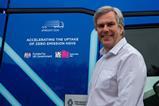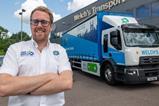Following an initial six-month consultation and call for partners, The TransiT Hub, led by Heriot-Watt University in Edinburgh and the University of Glasgow, has now received a £20m investment from the Engineering and Physical Sciences Research Council (EPSRC) and £26m from industry partners, to research
Thought to be the largest transport consortium of its kind, the 67 industry partners supporting the TransiT Hub come from a cross sector of digital, energy and transport organisations, including transport operators, regulators, vehicle makers, technology companies and energy suppliers.

The aim of the project is to create digital twins - digital replicas that collect data in real time by sensors connected to infrastructure such as roads, railways or shipping – to analyse and test real-world data in a digital environment to identify new and smart ways to decarbonise road, rail, air and maritime transport.
The study will also test how parts of a future decarbonised transport system that doesn’t exist yet, such as electric road systems and alternative fuels, could work in reality.
Transport Minister Mike Kane said: “Digital twinning is a powerful technology that can help us integrate transport networks, improve efficiency and deliver greener transport for all.”
He added that the next phase of the TransiT project is an important step that “brings together academia, industry and government to research and realise the benefits of this technology for the transport sector”.
The data to build the digital twins will come from TransiT’s industry partners, including the number and type of vehicles, fuel types, load sizes, length and frequency of routes.
From the road transport sector, trade bodies the Road Haulage Association (RHA) and Chartered Institute for Logistics and Transport (CILT), are involved, along with operators including DHL and retailers Ocado, Amazon, Tesco and John Lewis Partnership. Vehicle manufacturer HVS (Hydrogen Vehicle Systems) is also among the partners.
Chris Ashley, RHA lead for the environment, commented: “We strongly welcome the TransiT initiative. Cutting emissions is essential as we focus on Net Zero, and it’s vital we have a clear understanding over how this is achieved sustainably. This innovative work by Transit to pioneer “digital twinning” to replicate and model the physical world will inform our knowledge and, in turn, the investments needed.”
TransiT joint director Professor Phil Greening, of Heriot-Watt University, stressed that with transport accounting for about a third of UK carbon emissions and global temperatures rapidly rising, “we have run out of time to carry out real world transport trials and learn from them”.
“Digital twins will help us see the where, what and how to decarbonise transport,” he explained. “We start by building individual models of real-world transport systems. These can then be connected together and linked to the real world to give a bigger picture of what our future decarbonised transport system might look like – and the lowest cost way of getting there.”
The project is green-lighted for five years and will see eight universities each taking the lead on specific research areas:
- University of Cambridge: road freight (including the Centre for Sustainable Road Freight, a collaboration between Cambridge, Heriot-Watt and Westminster universities with industry and government partners)
- Heriot-Watt University: logistics and freight (including the Centre for Sustainable Road Freight and The Centre for Logistics and Sustainability)
- University of Birmingham: rail (including the university’s Birmingham Centre for Railway Research and Education, one of largest centres of its kind)
- Cranfield University: aviation (including the university’s globally-recognised Centre for Digital Engineering and Manufacturing)
- University College London: maritime (including the shipping research group at the university’s UCL Energy Institute)
- University of Glasgow: digital twinning and cyber physical systems (including the university’s research groups in Energy and Sustainability and Communication, Sensing and Imaging)
- University of Leeds: transport decarbonisation policy development (including the university’s Institute for Transport Studies, one of the UK’s leading departments for transport teaching and research)
- Durham University: engineering of public transport systems (including work on hydrogen transportation in the Durham Energy Institute)
For transport providers and investors, digital twinning reduces risk and cost, the TransiT researchers say. For example, logistics companies can use data from digital twinning to help them plan how to sustainably move freight in the future. This could include identifying the most sustainable routes, vehicle types, journey times, business models and collaborations.
Government policymakers also stand to benefit from TransiT by being able to see what intended and unintended consequences could result from their policy decisions across a range of future scenarios.


















